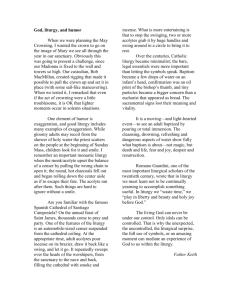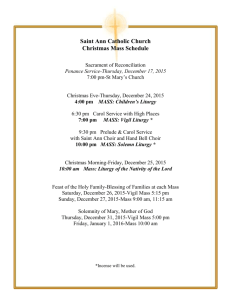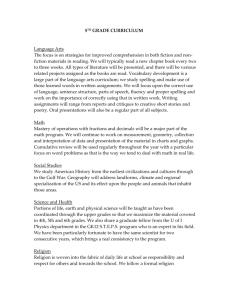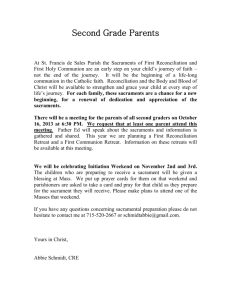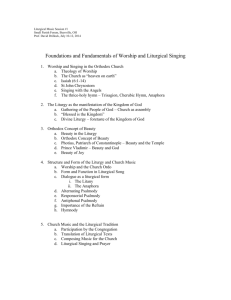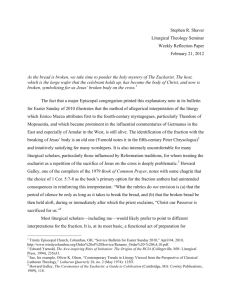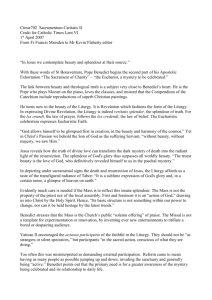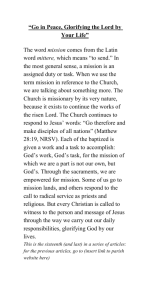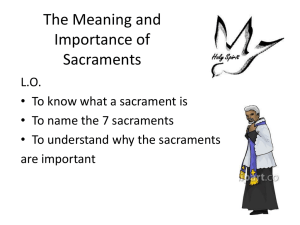Sacramental Theology - Siena Heights University
advertisement
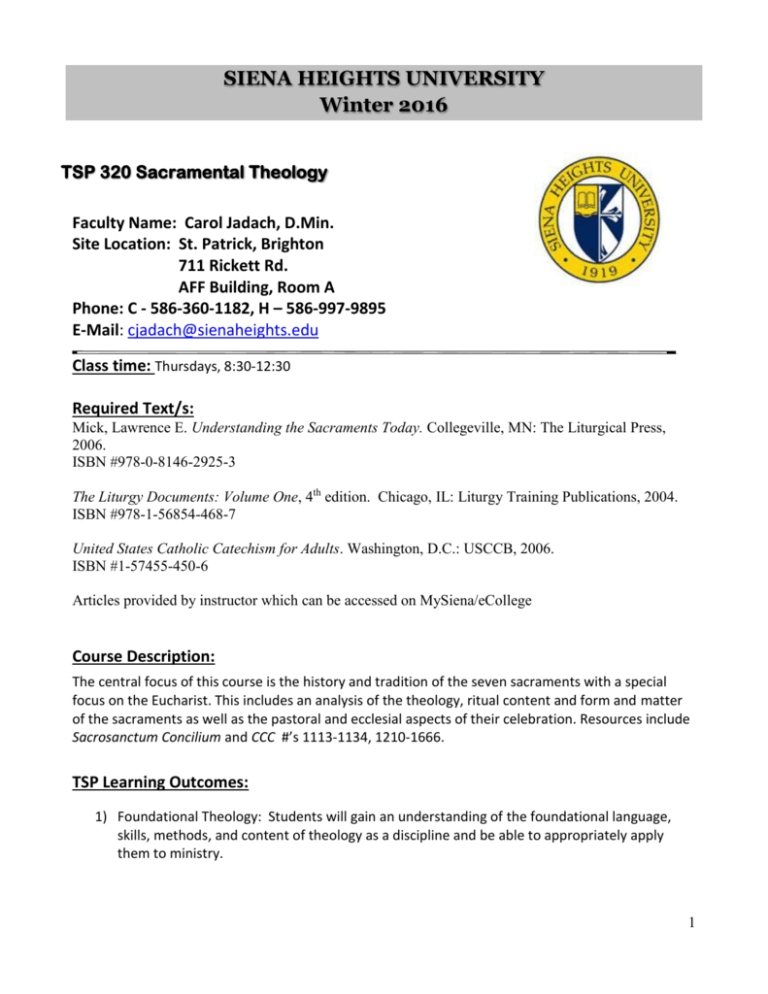
SIENA HEIGHTS UNIVERSITY Winter 2016 TSP 320 Sacramental Theology Faculty Name: Carol Jadach, D.Min. Site Location: St. Patrick, Brighton 711 Rickett Rd. AFF Building, Room A Phone: C - 586-360-1182, H – 586-997-9895 E-Mail: cjadach@sienaheights.edu Class time: Thursdays, 8:30-12:30 Required Text/s: Mick, Lawrence E. Understanding the Sacraments Today. Collegeville, MN: The Liturgical Press, 2006. ISBN #978-0-8146-2925-3 The Liturgy Documents: Volume One, 4th edition. Chicago, IL: Liturgy Training Publications, 2004. ISBN #978-1-56854-468-7 United States Catholic Catechism for Adults. Washington, D.C.: USCCB, 2006. ISBN #1-57455-450-6 Articles provided by instructor which can be accessed on MySiena/eCollege Course Description: The central focus of this course is the history and tradition of the seven sacraments with a special focus on the Eucharist. This includes an analysis of the theology, ritual content and form and matter of the sacraments as well as the pastoral and ecclesial aspects of their celebration. Resources include Sacrosanctum Concilium and CCC #’s 1113-1134, 1210-1666. TSP Learning Outcomes: 1) Foundational Theology: Students will gain an understanding of the foundational language, skills, methods, and content of theology as a discipline and be able to appropriately apply them to ministry. 1 2) Catholic World View: Students will learn the elements of the Catholic Christian worldview by drawing from its past in order to serve the world of the future. 3) Reflective Skills: Students will learn to reflect on their experience and world through a theological lens. 4) Liturgy: Students will understand the formal public prayer of the church and be able to explain it historical, theological and liturgical expressions. Relationship of TSP Outcomes to Liberal Arts Learning Outcomes: General Education Program Outcomes Foundational Theology Liberal Arts Learning #2-3 Catholic Worldview Reflective Skills Religious Traditions #3 #2 Critical Thinking #1-7 Liturgy #1-2 Communication #3 Learning Outcomes Assessment Plan: PROGRAM LEARNING OUTCOMES FOUNDATIONAL THEOLOGY COURSE OUTCOMES The fully participative learner will gain a fundamental understanding of liturgy from its historical, scriptural, theological, ritual, and ecclesiological perspectives LEARNING STRATEGIES ASSESSMENT TOOLS/STRATEGIES Paper and presentation focused on a specific aspect of liturgy Class discussions, class interaction and participation Review of church documents, DVDs and YouTube videos, class discussion Scenarios Opening prayer, active class discussions and participation, integration of course material CATHOLIC WORLDVIEW The fully participative learner will have a practical and working understanding of the basic liturgical documents and the Rites of the Church REFLECTIVE SKILLS The fully participative learner will understand liturgy’s capacity to shape and form a community through its intrinsic relationship with the daily life of a Christian Paper and presentation focused on ritual and symbol Scenarios Opening prayer, praxis discussions LITURGY The fully participative learner will understand the formal public prayer of the church and be able to explain Paper and presentation focused on ritual and Active class discussions, ability to see and acknowledge various points of view 2 PROGRAM LEARNING OUTCOMES COURSE OUTCOMES its historical, theological and liturgical expressions. STUDENT LEARNING STRATEGIES ASSESSMENT TOOLS/STRATEGIES symbol, preparing and leading the class prayer Scenarios (Name your own desired outcome) Course Requirements: 1. Expectations Students are expected to be on time for and attend all class sessions unless excused by the instructor. It is the student’s responsibility to obtain materials distributed during class in the event of an unavoidable absence. Students should come to class prepared to discuss the assigned reading. Completed assignments are to be handed in on the date due. Late assignments may be subjected to a lower grade. All assignments – oral and written as described in the syllabus – are to reflect quality undergraduate work. Written papers are to be typed, double-spaced, size 12 font, free from spelling and grammatical errors, and presented in a clear and concise manner with appropriate bibliography when needed. Recording devises may not be used in class. Personal computers, ipads, notebooks, tablets, and hand-held devices may be used in class only with the permission of the instructor. Academic dishonesty and plagiarism, described below, will never be tolerated. Academic dishonesty is unethical behavior which in any way violates the standards of scholarly conduct. It includes such behaviors as cheating on assignments or examinations, plagiarizing, submitting the same or essentially the same papers for more than one course without the consent of all instructors concerned, misappropriating library materials, or the destroying of or tampering with computer files. Also included in academic dishonesty is knowingly or intentionally helping another violate any part of this policy. Plagiarism is the failure to give credit for the use of material from outside sources. It includes, but is not limited to, verbatim use of a quote without quotation marks and adequate documentation, submission of a paper prepared by another person as one’s own work, using the ideas, facts, words, or data of someone else and claiming them as your own, or not documenting ideas, facts, words, or data gathered during research. Students with a Learning Disability 3 Section 504 of the Rehabilitation Act of 1973 (Section 504), prohibits discrimination on the basis of physical or mental disability (29 U.S.C. Section 794). Siena Heights University is committed to furnishing appropriate auxiliary aids and services where necessary to afford any student with a disability an equal opportunity to participate in, and enjoy the benefits of, a service, program, or activity conducted by a public entity. An academically qualified (has met admission standards) student with a disability who is in need of auxiliary aids/services is obligated to provide detailed documentation of the nature of the disabling condition to the Office of Disability Resources (303 Sacred Heart Hall/ 517 264-7683). The student will discuss with the coordinator of the ODR how the disability impacts performance in the academic setting. The student should initiate this process at the beginning of the semester, so that accommodations may be arranged before the student experiences difficulty. This process is not retroactive-a student may not disclose a disability in order to retake a failed test. Once appropriate accommodations/services have been determined, the student presents a Letter of Accommodation (provided after consultation with the coordinator of the ODR) to his/her course teaching staff and discusses a plan for implementing the accommodation/service. 2. Assignments A. Weekly reading assignments: Assigned and elective readings as noted on the syllabus. B. Class Prayer: Students will prepare a 5-7 minute class prayer relevant to the topic of the day’s class. Various prayer forms should be employed (ex. morning prayer, rote prayer, spontaneous prayer, gestures, ritual, music, Scripture, etc.) and handouts should be provided for the participants. C. Papers: Due January 28: 2-3 page timeline tracing the development of the Mass in the Latin Church through the lens of one of the following: architecture, music, language, sacred vessels, or liturgical texts. See Study Sheet #1. Due Dates reflected in the syllabus Students will write 4-5 pages on the ritual and symbols of Confirmation, Penance, Anointing of the Sick, Marriage, or Holy Orders, tracing the use, meaning, and significance of the ritual and symbols over time and including 2-3 scriptural references. This is a research paper; therefore, footnotes/endnotes and bibliography should be included. In addition, you will collaborate with a fellow student to prepare a 10-15 minute presentation on your papers to be given during the class session in which the sacrament is the topic. D. Final Exam: April 14 E. There may be periodic quizzes. 4 3. Grading 20% 20% 15% 15% 30% Attendance, Reading Assignments, Class Participation, Prayer Timeline Symbol Project - Paper Symbol Project - Presentation Final Exam Standard SHU grade scale: 100-92 A 91-82 B 81-72 C 71-62 D 61 & below E 5 TSP 320 Sacramental Theology Siena Heights University Winter Semester – 2016 Tentative Weekly Schedule January 14, 2016 CLASS #1 CONTENT: Overview of syllabus Introduction to material Terms January 21, 2016 PREPARATION FOR CLASS: Read the Constitution on the Sacred Liturgy, #1-82, 102-111 Read USCCA, pp.165-179 CLASS #2 CONTENT: Overview of Liturgy Overview of Sacrament The role of faith Ritual and symbol January 28, 2016 PREPARATION FOR CLASS: Timeline due Read GIRM #1-111 CLASS #3 CONTENT: Continuation of Content Class #2 History of the liturgy The Mass February 4 – No Class February 11, 2016 PREPARATION FOR CLASS: Read Mick, pp.1-31 Read USCCA, pp.181-211 CLASS #5 CONTENT: Sacrament of Baptism The role of the community Sacrament of Confirmation The role of the sponsor 6 February 18, 2016 PREPARATION FOR CLASS: Presentation/Paper due – Confirmation Read RCIA #1-251 CLASS #6 CONTENT: Continuation of Content Class #5 Overview of Rite of Christian Initiation of Adults (RCIA) February 25, 2016 - MIDTERM PREPARATION FOR CLASS: Read Mick, pp.33-52 Read USCCA, pp.213-232 CLASS #7 CONTENT: Sacrament of Eucharist Source and summit Eucharist as a sacrament of initiation Models of Eucharist March 3, 2016 – No Class March 10, 2016 PREPARATION FOR CLASS: Presentation/Paper due - Penance Read Mick, pp.55-92 Read USCCA, pp.233-259 CLASS #9 CONTENT: Sacrament of Penance and Reconciliation Grace and sin Conversion The role of the community Sacrament of Anointing of the Sick The role of suffering March 17, 2016 PREPARATION FOR CLASS: Presentation/Paper due – Anointing of the Sick Read Mick, pp.94-111 Read USCCA, pp.277-292 CLASS #10 CONTENT: Continuation of Content Class #9 Sacrament of Marriage The role of the community 7 March 24, 2016 – No Class…Holy Thursday March 31, 2016 PREPARATION FOR CLASS: Presentation/Paper due – Marriage Presentation/Paper due – Holy Orders Read Mick, pp.113-130 Read USCCA, pp.261-275 CLASS #11 CONTENT: Continuation of Content Class #10 Sacrament of Holy Orders April 7, 2016 PREPARATION FOR CLASS: Read USCCA, pp.293-303 CLASS #13 CONTENT: Sacramental and popular devotions Pastoral questions April 14, 2016 – FINAL EXAM 8 TSP 320 Sacramental Theology Siena Heights University Winter Semester – 2016 BIBLIOGRAPHY Bausch, William J. A New Look at Sacraments. Mystic, CT: Twenty-Third Publications, 1983. Foley, Edward. From Age to Age: How Christians Have Celebrated the Eucharist. Collegeville, MN: The Liturgical Press, 2008. Guzie, Tad. The Book of Sacramental Basics. New York, NY: Paulist Press, 1981. Hater, Fr. Robert J. Gateways to God: Celebrating the Sacraments. Huntington, IN: Our Sunday Visitor Pub., 2011. Irwin, Kevin W. Models of the Eucharist. Mahwah, NJ: Paulist Press, 2005. Kavanagh, Aidan. Elements of Rite. Collegeville, MN: The Liturgical Press, 1990. Kavanagh, Aidan. The Shape of Baptism: The Rite of Christian Initiation. Collegeville, MN: The Liturgical Press, 1991. Kelly, Liam. Sacraments Revisited. New York, NY: Paulist Press, 1998. Klein, Gregory L. and Robert A Wolfe. Pastoral Foundations of the Sacraments: A Catholic Perspective. Mahwah, NJ: Paulist Press, 1998. Lawler, Michael J. Symbol and Sacrament: A Contemporary Sacramental Theology. Mahwah, NJ: Paulist Press, 1987. Lebon, Jean. How to Understand the Liturgy. New York, NY: Crossroad Publishing Co., 1996. Lysik, David (ed.). The Liturgy Documents, Volume One (4th ed.). Chicago, IL: Liturgy Training Publications, 2004. Lysik, David (ed.). The Liturgy Documents, Volume Two. Chicago, IL: Liturgy Training Publications, 1999. Martos, Joseph. Doors to the Sacred: A Historical Introduction to Sacraments in the Catholic Church, Revised and Updated. Liguori, Missouri: Liguori Publications, 2001. McKenna, John H. CM. Become What You Receive: A Systematic Study of the Eucharist. Chicago, IL: Liturgy Training Publications, 2012. Mick, Lawrence E. Understanding the Sacraments Today. Collegeville, MN: The Liturgical Press, 2006. 9 Mitchell, Leonel L. The Meaning of Ritual. New York, NY: Paulist Press, 1977. Mitchell, Nathan D. Meeting Mystery. New York, NY: Orbis Books, 2006. Murphy Center for Liturgical Research. Made, Not Born: New Perspectives on Christian Initiation And the Catechumenate. Notre Dame, IN: University of Notre Dame Press, 1976. Noll, Ray R. Sacraments: A New Understanding for a New Generation. Mystic, CT: Twenty-Third Publications, 1999. Osborne, Kenan B. Christian Sacraments in a Postmodern World. Mahwah, NJ: Paulist Press, 1999. Osborne, Kenan B. Sacramental Theology. Mahwah, NJ: Paulist Press, 1988. Osborne, Kenan B. The Christian Sacraments of Initiation. Mahwah, NJ: Paulist Press, 1987. Pope John Paul II. Apostolic Letter on Reconciliation and Penance. 1984. Reid, Alcuin, OSB. The Organic Development of the Liturgy (2nd ed.). San Francisco, CA: Ignatius Press, 2005. Rite of Christian Initiation of Adults (RCIA). Chicago, IL: Liturgy Training Publications, 1988. Warren, Michael. Faith, Culture, and the Worshiping Community. New York, NY: Paulist Press, 1989. Yarnold, Edward. The Awe-Inspiring Rites of Initiation: The Origins of the RCIA. Collegeville, MN: The Liturgical Press, 1994. WEBLIOGRAPHY Catholic News Service (www.catholicnews.com) Includes a link to Origins. Federation of Diocesan Liturgical Commissions (www.fdlc.org) National Conference for Catechetical Leaders (www.nccl.org) National Pastoral Life Center (www.nplc.org) United States Conference of Catholic Bishops (www.nccbuscc.org) The Vatican (www.vatican.va) 10
